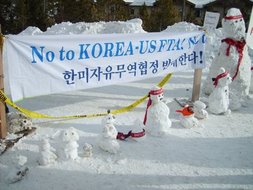Working people in the United States and South Korea join today in vigorously opposing the Korea-U.S. Free Trade Agreement (KORUS FTA), and we will send a powerful message to the U.S. Congress and the Korean Parliament that any trade agreement between our countries must protect the fundamental rights of workers and contribute to the creation of good jobs in both countries.
The agreement, which is the largest since the North America Free Trade Agreement (NAFTA), will not benefit the working people of the United States or South Korea. The AFL-CIO along with our Korean union counterparts, the Korean Confederation of Trade Unions (KCTU) and the Federation of Korean Trade Unions (FKTU) strongly oppose any agreement that will hurt working families, farmers, and domestic producers in both countries. This flawed deal contains no enforceable protections for core workers’ rights, and it will undermine both governments’ ability to provide affordable and high-quality public and social services, and to protect food safety, the environment, and public health.
This agreement is likely to exacerbate and accelerate the loss of good jobs in the U.S. manufacturing sector, especially in autos, apparel, and electronics. We already have a $14 billion trade deficit with South Korea – almost $12 billion of that in autos and auto parts. This deal will likely jeopardize tens of thousands of U.S. auto jobs – opening the U.S. auto market further, while failing to address the array of formal and informal barriers to the sale of U.S. automobiles in South Korea. Unfortunately, the U.S. Trade Representative (USTR) rejected the very sensible proposal put forward by a bipartisan group of members of Congress to tie any opening of the U.S. auto market to concrete benchmarks in U.S. auto sales in Korea. We have little confidence that our negotiators have successfully addressed the enormous imbalance in auto trade with traditional tariff-lowering proposals.
While details of the agreement have not yet been made public, we are deeply concerned at press reports that the FTA includes market access benefits for products made in the industrial zone in the North Korean border city of Kaesong. Workers in Kaesong have no ability whatsoever to exercise their basic human rights to freedom of association, to organize, and to bargain collectively. They are essentially indentured servants of the North Korean government – not allowed to collect wages directly from their South Korean employers, but paid only by the North Korean government after arbitrary and excessive deductions. It is completely unacceptable for products made under these repressive conditions to receive preferential access to the U.S. market.
Finally, this deal does not incorporate enforceable protections for the ILO core labor standards, but includes instead only a weak provision that the countries must each enforce their own labor laws. Countries may weaken their labor laws at any time without penalty.
The KORUS FTA does not reflect the proposals on workers’ rights, environmental protections, investment, procurement, and prescription drugs put forward by House Democrats recently. Those proposals reflect widely shared concerns, and members of Congress should reject any agreement that does not fully incorporate them.

1 comment:
Thanks for your valuable information. It really gives me an insight on this topic. I'll visit here again for more information.
south korea company registration
Post a Comment